Related Research Articles
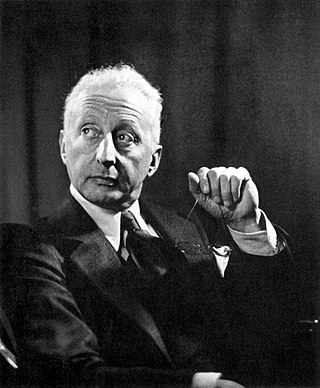
Jerome David Kern was an American composer of musical theatre and popular music. One of the most important American theatre composers of the early 20th century, he wrote more than 700 songs, used in over 100 stage works, including such classics as "Ol' Man River", "Can't Help Lovin' Dat Man", "A Fine Romance", "Smoke Gets in Your Eyes", "The Song Is You", "All the Things You Are", "The Way You Look Tonight" and "Long Ago ". He collaborated with many of the leading librettists and lyricists of his era, including George Grossmith Jr., Guy Bolton, P. G. Wodehouse, Otto Harbach, Oscar Hammerstein II, Dorothy Fields, Johnny Mercer, Ira Gershwin and Yip Harburg.
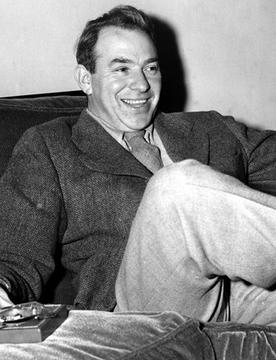
Edgar Yipsel Harburg was an American popular song lyricist and librettist who worked with many well-known composers. He wrote the lyrics to the standards "Brother, Can You Spare a Dime?", "April in Paris", and "It's Only a Paper Moon", as well as all of the songs for the film The Wizard of Oz, including "Over the Rainbow". He was known for the social commentary of his lyrics, as well as his leftist leanings. He championed racial and gender equality and union politics. He also was an ardent critic of religion.

Harold Arlen was an American composer of popular music, who composed over 500 songs, a number of which have become known worldwide. In addition to composing the songs for the 1939 film The Wizard of Oz, including "Over the Rainbow", Arlen is a highly regarded contributor to the Great American Songbook. "Over the Rainbow" was voted the 20th century's No. 1 song by the RIAA and the NEA.
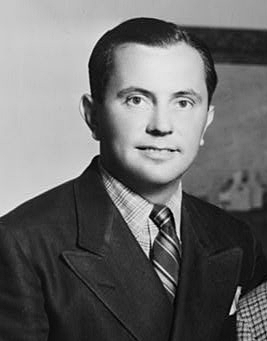
Vernon Duke was a Russian-born American composer/songwriter who also wrote under his birth name, Vladimir Dukelsky. He is best known for "Taking a Chance on Love," with lyrics by Ted Fetter and John Latouche (1940), "I Can't Get Started," with lyrics by Ira Gershwin (1936), "April in Paris," with lyrics by E. Y. ("Yip") Harburg (1932), and "What Is There To Say," for the Ziegfeld Follies of 1934, also with Harburg. He wrote the words and music for "Autumn in New York" (1934) for the revue Thumbs Up! In his book, American Popular Song, The Great Innovators 1900-1950, composer Alec Wilder praises this song, writing, “The verse may be the most ambitious I’ve ever seen." Duke also collaborated with lyricists Johnny Mercer, Ogden Nash, and Sammy Cahn.
"I Got Rhythm" is a piece composed by George Gershwin with lyrics by Ira Gershwin and published in 1930, which became a jazz standard. Its chord progression, known as the "rhythm changes", is the foundation for many other popular jazz tunes such as Charlie Parker's and Dizzy Gillespie's bebop standard "Anthropology ".
"We're Off to See the Wizard" is one of the classic and most memorable songs from the Academy Award-winning 1939 film The Wizard of Oz. Composer Harold Arlen described it, along with "The Merry Old Land of Oz" and "Ding-Dong! The Witch Is Dead", as one of the "lemon drop" songs of the film. The lyrics are by E.Y. "Yip" Harburg.

Ella Fitzgerald Sings the Harold Arlen Song Book is a 1961 album by the American jazz singer Ella Fitzgerald, with a studio orchestra conducted and arranged by Billy May. This album marked the only time that Fitzgerald worked with May.
Nadine Dana Suesse was an American musician, composer and lyricist.
"If I Were King of the Forest" is a song from the 1939 film The Wizard of Oz, with music by Harold Arlen and lyrics by E.Y. Harburg.

John Murray Anderson was a Canadian theatre director and producer, songwriter, actor, screenwriter, dancer and lighting designer, who made his career in the United States, primarily in New York City and Hollywood. He worked in almost every genre of show business, including vaudeville, Broadway, and film. He also directed plays in London.
"Let's Take a Walk Around the Block" is a popular song composed by Harold Arlen, with lyrics written by Ira Gershwin and E.Y. Harburg.
"Old Devil Moon" is a popular song composed by Burton Lane with lyrics by Yip Harburg for the 1947 musical Finian's Rainbow. It was introduced by Ella Logan and Donald Richards in the Broadway show. The song takes its title from a phrase in "Fun to Be Fooled", a song that Harburg wrote with Harold Arlen and Ira Gershwin for the 1934 musical Life Begins at 8:40.

Tony Bennett at Carnegie Hall is a 1962 live album by Tony Bennett. The June 9th concert was directed by Arthur Penn and Gene Saks. Carnegie Hall had not featured a pop performer until April 23, 1961 when Judy Garland recorded her legendary concert.
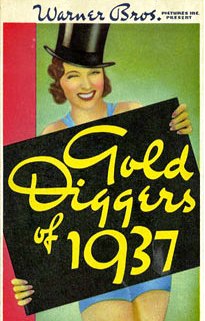
Gold Diggers of 1937 is a Warner Bros. movie musical directed by Lloyd Bacon with musical numbers created and directed by Busby Berkeley. The film stars Dick Powell and Joan Blondell, who were married at the time, with Glenda Farrell and Victor Moore.
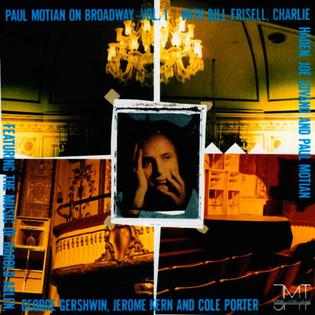
On Broadway Volume 1 is the second album by Paul Motian to be released on the German JMT label. It was released in 1989 and features performances of Broadway show tunes by Motian with guitarist Bill Frisell and tenor saxophonist Joe Lovano. The album was followed by four subsequent volumes, and it was rereleased on the Winter & Winter label in 2003.

All or Nothing at All is a studio album by Billie Holiday, released in 1958 on Verve Records, catalog MGV8329. There are 12 songs on the LP taken from five different recording sessions that took place in 1956 and 1957. Holiday was backed by a "relaxed and understanding" small combo which included the trumpeter Harry "Sweets" Edison and the saxophonist Ben Webster. A 1959 New York Times article noted that Holiday's voice "had become a very limited instrument which she used with the craft and guile of an aging pitcher who can no longer pour his fast one across the plate."

"Do It Again" is an American popular song by composer George Gershwin and lyricist Buddy DeSylva. The song premiered in the 1922 Broadway show The French Doll, as performed by actress Irène Bordoni.

The Rhythms and Ballads of Broadway is a double album by American pop singer Johnny Mathis that was released in September 1960 by Columbia Records. Despite the order of the words in the title, the ballads actually make up sides one and two while the uptempo numbers fill sides three and four.

Americana is a musical revue in two parts, with book and lyrics by J. P. McEvoy, and music by Con Conrad with additional numbers by George Gershwin, Ira Gershwin, Philip Charig, James Hanley, B. G. DeSylva, Morrie Ryskind, Arthur Schwartz, Theo Goodwin, Joe Young, and Sam Lewis. The show was presented by Richard Herndon at the Belmont Theatre, and, after many postponements, opened July 26, 1926. The show was staged by Allan Dinehart with dance numbers by Larry Ceballos. The production was designed by John Held, Jr. It ran for 224 performances, closing in February 1927. The cast headlined Lew Brice, Roy Atwell, Betty Compton, Charles Butterworth and the Eddie Elkins Orchestra. The New York Times review called it a "witty, ingenious and sophisticated evening of fun-making, it made up in its abundant humor for more than it lacked in some other departments." The other departments referred to were lack of chorus girls and opulent settings.

Sinatra: World On a String is a 2016 box set album of live performances by the American singer Frank Sinatra, recorded in Italy in 1953, Monaco in 1958, Sydney in 1961, Cairo in 1979, and the Dominican Republic in 1982. The performances are chronicled on four compact discs with a further DVD of a 1962 concert in Tokyo with short films and Italian chocolate adverts featuring Sinatra during his world tour of 1962.
References
- ↑ Suskin, Steven, Show Tunes: The Songs, Shows, and Careers of Broadway's Major Composers. Oxford University Press 2000. ISBN 0-19-512599-1, pp. 52-53
- ↑ Bloom, Ken, Broadway: Its History, People, and Places. Taylor & Francis 2004. ISBN 0-415-93704-3, p. 565
- ↑ Lahr, John, Notes on a Cowardly Lion: The Biography of Bert Lahr. University of California Press 2000. ISBN 0-520-22304-7, pp. 135-142
- ↑ Time review
- ↑ Liner Notes to Life Begins at 8:40, concert recording (2010), CD issued 2010, PS Classics